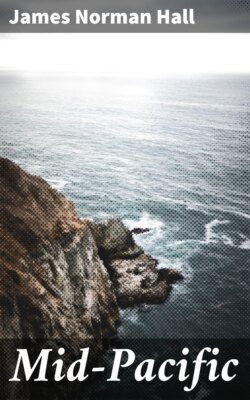Читать книгу Mid-Pacific - James Norman Hall - Страница 4
На сайте Литреса книга снята с продажи.
I
ОглавлениеTable of Contents
I was at a loose end that spring, in common with hundreds of thousands of other men, most of them just out of the demobilization camps, with the ink on their army discharge papers scarcely dried. Day after day there had been a shrieking of sirens and a tooting of whistles in New York harbor as the troop ships returned from France. The canyon-like streets echoed and reëchoed with a confused tumult of shouting, and looking up, one saw tier after tier of blurred faces at the windows of lofty office buildings. There were parades up and down Fifth Avenue, regimental reunions, public receptions, innumerable addresses of welcome. But the most memorable sight, to me, was the line of soldiers filing eagerly in and happily out of every shop where ready-made, civilian clothing was sold. I remember vividly my own keen pleasure as I came from one of those places with my uniform in a paper parcel under my arm. That chapter of experience was definitely closed.
It was bright, windy March weather. The days were lengthening perceptibly, but for all that they were not long enough by half for the enjoyment of the blessed sense of freedom one had. A week passed, and during this time I was as idle as it is possible to be. I rose late of a morning and had breakfast in my room. Then, with a book in my pocket or under my arm, I would seek out the quietest places I could find. Usually I spent the mornings in Bronx Park, and the afternoons in wandering through the Art Museum or the National History Museum. But it was impossible to find solitude in New York, and one wanted it badly after the experience overseas. I felt that I could never have enough of it now, even though I were to spend the rest of my life on some uninhabited island, a thousand miles from the nearest steamship route. ‘I might seek out such an island,’ I thought, as I stood in a subway train, tightly wedged in a solid mass of humanity. ‘There must be many of them scattered over the seven seas.’ I had some money—not a large amount, but enough to carry me to the other side of the world if I wished to go so far. The more I thought of an island sojourn the more the idea appealed to me, and the upshot of the matter was that after many imaginary journeys, I decided to set out, in reality, for a period of wandering among some of the remote archipelagos of the South Pacific.
A friend, resident in New York, went with me for purposes of identification, to the passport office. Prospective travelers were lined five deep in front of the counter, for the great horde of souvenir hunters was already preparing for the invasion of the battlefields of France. The clerks were being harassed with questions from a dozen applicants at once, and had reason, I thought, to be out of patience and temper. My turn came at length, and a young woman, seizing an application blank, said, ‘I’ll make this out for you. Save time.’ She did it very rapidly: name, description of bearer, distinguishing marks or features, place of birth, date of birth. I answered with alacrity until she asked, ‘What occupation?’
‘I haven’t any,’ I replied, ‘unless “ex-soldier” is considered one.’
‘What were you before the war?’
‘Oh, various things, but none of them will do now. Can’t you leave the space blank?’
‘No,’ she replied, ‘I must write in something.’ She waited with pen poised. A drop of ink gathered at the point and splashed on the paper. She blotted it impatiently.
‘Please hurry!’ she said. ‘There are others waiting.’
There were many others waiting. I heard behind me a nervous tapping of feet and several exasperated sighs.
‘Why don’t you put down “Journalist”?’ my friend suggested. ‘Didn’t you used to write things occasionally for newspapers and magazines?’
‘Yes, but only occasionally,’ I said. ‘It was never an occupation. I couldn’t be called a——’
‘It doesn’t matter; “Journalist” will do,’ said the young woman, writing rapidly. ‘Have you your photographs? The fee is ten dollars. Next, please!’
